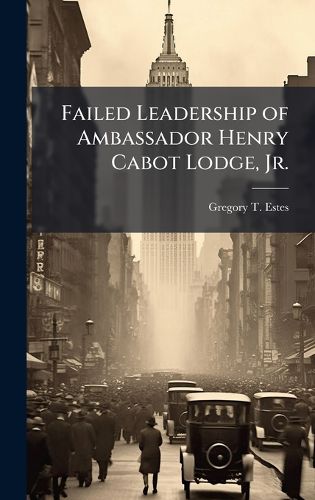Readings Newsletter
Become a Readings Member to make your shopping experience even easier.
Sign in or sign up for free!
You’re not far away from qualifying for FREE standard shipping within Australia
You’ve qualified for FREE standard shipping within Australia
The cart is loading…






The primary players in the 1964 decision to increase United States troop levels in Vietnam agreed that pacification was instrumental to success. Under Ambassador Lodge's leadership, pacification efforts by civilian agencies failed to capitalize on the initial stability provided by significant troop increases. Once this initial window of stability was missed, the United States continued focus on conventional threats prevented a shift to counter insurgency. By looking at the telegram and memorandum traffic among the Johnson Administration and between the Administration and the Vietnam Embassy, indications of Ambassador Lodge's leadership style and reluctance to change offer clues to the cause. The Administration forced consecutive reorganization efforts to produce pacification success. But the failure was in the man in charge and not the organizational structure.
This work has been selected by scholars as being culturally important, and is part of the knowledge base of civilization as we know it. This work was reproduced from the original artifact, and remains as true to the original work as possible. Therefore, you will see the original copyright references, library stamps (as most of these works have been housed in our most important libraries around the world), and other notations in the work.
This work is in the public domain in the United States of America, and possibly other nations. Within the United States, you may freely copy and distribute this work, as no entity (individual or corporate) has a copyright on the body of the work.
As a reproduction of a historical artifact, this work may contain missing or blurred pages, poor pictures, errant marks, etc. Scholars believe, and we concur, that this work is important enough to be preserved, reproduced, and made generally available to the public. We appreciate your support of the preservation process, and thank you for being an important part of keeping this knowledge alive and relevant.
$9.00 standard shipping within Australia
FREE standard shipping within Australia for orders over $100.00
Express & International shipping calculated at checkout
Stock availability can be subject to change without notice. We recommend calling the shop or contacting our online team to check availability of low stock items. Please see our Shopping Online page for more details.
The primary players in the 1964 decision to increase United States troop levels in Vietnam agreed that pacification was instrumental to success. Under Ambassador Lodge's leadership, pacification efforts by civilian agencies failed to capitalize on the initial stability provided by significant troop increases. Once this initial window of stability was missed, the United States continued focus on conventional threats prevented a shift to counter insurgency. By looking at the telegram and memorandum traffic among the Johnson Administration and between the Administration and the Vietnam Embassy, indications of Ambassador Lodge's leadership style and reluctance to change offer clues to the cause. The Administration forced consecutive reorganization efforts to produce pacification success. But the failure was in the man in charge and not the organizational structure.
This work has been selected by scholars as being culturally important, and is part of the knowledge base of civilization as we know it. This work was reproduced from the original artifact, and remains as true to the original work as possible. Therefore, you will see the original copyright references, library stamps (as most of these works have been housed in our most important libraries around the world), and other notations in the work.
This work is in the public domain in the United States of America, and possibly other nations. Within the United States, you may freely copy and distribute this work, as no entity (individual or corporate) has a copyright on the body of the work.
As a reproduction of a historical artifact, this work may contain missing or blurred pages, poor pictures, errant marks, etc. Scholars believe, and we concur, that this work is important enough to be preserved, reproduced, and made generally available to the public. We appreciate your support of the preservation process, and thank you for being an important part of keeping this knowledge alive and relevant.